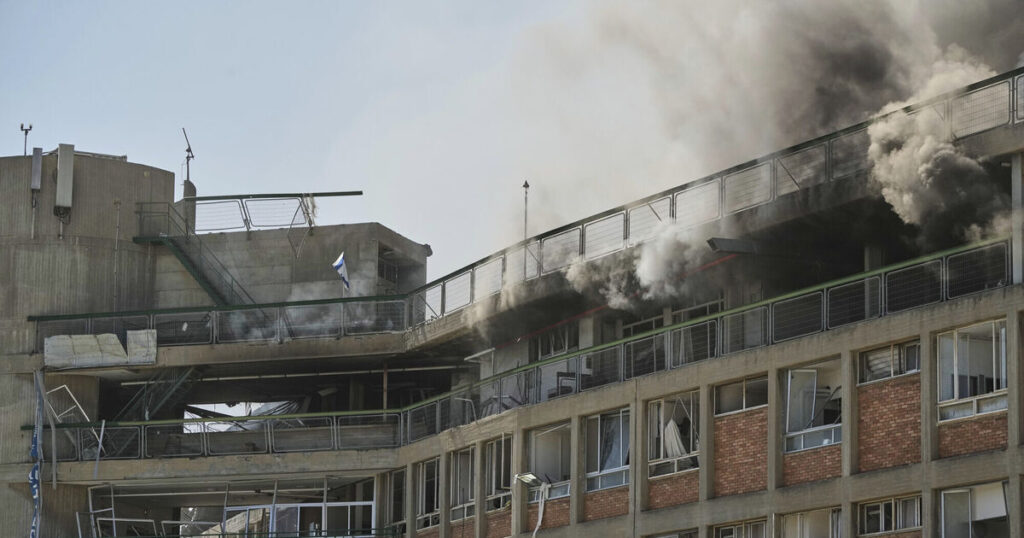Israel’s defence minister has overtly threatened Iran’s supreme leader after the latest missile barrage from Iran damaged a major hospital and hit a high-rise and several other residential buildings near Tel Aviv.
At least 40 people were wounded in the attacks, according to Israel’s Magen David Adom rescue service.
Black smoke rose from the Soroka Medical Centre in the southern city of Beersheba as emergency teams evacuated patients. There were no serious injuries in the strike on the hospital.
In the aftermath of the strikes, Israeli defence minister Israel Katz blamed Iran’s supreme leader, Ayatollah Ali Khamenei and said the military “has been instructed and knows that in order to achieve all of its goals, this man absolutely should not continue to exist”.
US officials said this week that US president Donald Trump had vetoed an Israeli plan to kill Mr Khamenei. Mr Trump later said there were no plans to kill him “at least not for now”.
Meanwhile, Israel carried out strikes on Iran’s Arak heavy water reactor, in its latest attack on the country’s sprawling nuclear programme, on the seventh day of a conflict that began with a surprise wave of Israeli airstrikes targeting military sites, senior officers and nuclear scientists.
A Washington-based Iranian human rights group said at least 639 people, including 263 civilians, have been killed in Iran and more than 1,300 wounded.
In retaliation, Iran has fired some 400 missiles and hundreds of drones, killing at least 24 people in Israel and wounding hundreds.
Two doctors told The Associated Press that the missile struck almost immediately after air raid sirens went off, causing a loud explosion that could be heard from a safe room.
The hospital said the main impact was on an old surgery building that had been evacuated in recent days. After the strike, the medical facility was closed to all patients except for life-threatening cases, it said.
Soroka has more than 1,000 beds and provides services to around one million residents in the south of Israel.
Israeli prime minister Benjamin Netanyahu condemned the strike on the hospital and vowed a response, saying: “We will exact the full price from the tyrants in Tehran.”
Iran has fired hundreds of missiles and drones at Israel, although most have been shot down by Israel’s multi-tiered air defences, which detect incoming fire and shoot down missiles heading towards population centres and critical infrastructure. Israeli officials acknowledge it is imperfect.
Haim Bublil, a local police commander, told reporters that several people were lightly wounded in the strike.
Many hospitals in Israel activated emergency plans in the past week, converting underground parking to hospital floors and moving patients underground, especially those who are on ventilators or are difficult to move quickly.
Israel also boasts a fortified, subterranean blood bank that kicked into action after Hamas’s October 7 2023, attack ignited the ongoing war in the Gaza Strip.
Israel’s military said its fighter jets targeted the Arak facility and its reactor core seal to halt it from being used to produce plutonium.
“The strike targeted the component intended for plutonium production, in order to prevent the reactor from being restored and used for nuclear weapons development,” the military said.
Israel separately claimed to have struck another site around Natanz it described as being related to Iran’s nuclear programme.
Iranian state TV said there was “no radiation danger whatsoever” from the attack on the Arak site.
An Iranian state television reporter, speaking live in the nearby town of Khondab, said the facility had been evacuated and there was no damage to civilian areas around the reactor.
Israel had warned earlier on Thursday morning that it would attack the facility and urged the public to flee the area.
Iran has long maintained that its programme is for peaceful purposes. But it also enriches uranium up to 60%, a short, technical step away from weapons-grade levels of 90%. Iran is the only non-nuclear-weapon state to enrich at that level.
Israel is the only nuclear-armed state in the Middle East but does not acknowledge having such weapons.
The strikes came a day after Iran’s supreme leader rejected US calls for surrender and warned that any military involvement by the Americans would cause “irreparable damage to them”. Israel had lifted some restrictions on daily life on Wednesday, suggesting the missile threat from Iran on its territory was easing.
Already, Israel’s campaign has targeted Iran’s enrichment site at Natanz, centrifuge workshops around Tehran and a nuclear site in Isfahan. Its strikes have also killed top generals and nuclear scientists.
Iran’s foreign minister, Abbas Araghchi, said he would travel to Geneva for meetings with his European counterparts on Friday, indicating that a new diplomatic initiative might be taking shape.
Iran’s official IRNA news agency said the meeting would include foreign ministers from the UK, France and Germany and the European Union’s top diplomat.
Mr Trump has said he wants something “much bigger” than a ceasefire and has not ruled out the US joining Israel’s campaign. Iran has warned of dire consequences if the US deepens its involvement, without elaborating.


